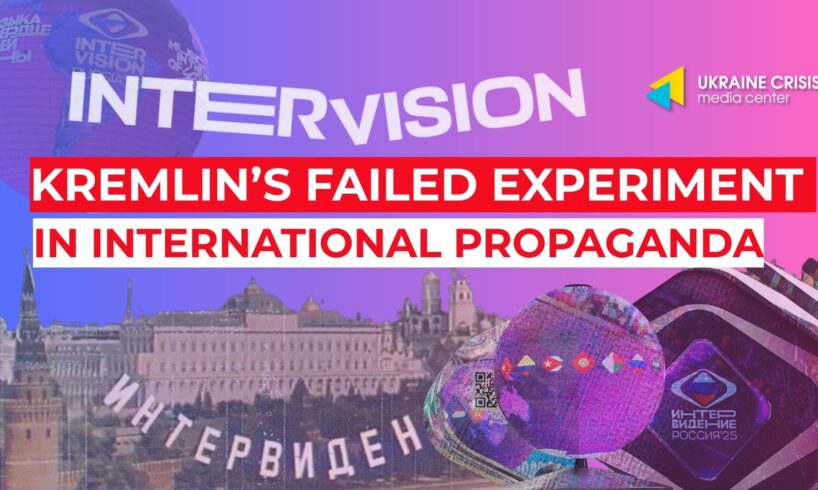
On September 20, 2025, the first revived international song contest “Intervision-2025” took place in Moscow. It is worth recalling that a contest under the same name was held from 1965 to 1980 in the countries of the socialist bloc. The Putin regime “cultivated” the idea of reviving the song competition under its own aegis since the late 2000s. However, Moscow finally managed to bring the project to life only this year. Singers from BRICS countries, the CIS, Latin America, and the Middle East took part in the contest.
““Big Brother is Watching You”: Russian Dictator ‘Appeared’ on the Intervision-2025 Stage
According to the organizers, the contest received record viewership worldwide – it was declared that there were “4 billion viewers.” However, the real figures were much more modest: only 6.7 million people actually watched the broadcast on Russia’s “First Channel,” and the total online platform audience reached about 17 million views. Even commentators and Telegram channels loyal to the Kremlin noted that the information about billions of viewers contradicted common sense.
Many pro-Kremlin Telegram channels sharply criticized “Intervision,” seeing in the contest only a “failed response to Eurovision.” They emphasized inconsistencies between the “picture” of the show and the organizers’ declarations about the defense of “traditional values.” Yet the greatest outrage among Russian propagandists and radical patriots was caused by the victory of Vietnamese gay singer Duc Phuc. Commentators called it a “triumph of the LGBT lobby” and a “blow to traditional values,” accusing the show of displaying “indecencies.”
Winner of Intervision-2025: Vietnam’s Representative Duc Phuc
The budget of the contest (750 million rubles from the federal budget plus financing from Kremlin-linked business corporations) also became a reason for accusations of wastefulness.
At the same time, theories of “betrayal” appeared – allegedly the contest “undermined relations with China” because of the anti-Chinese theme of the winning song. Some commentators even claimed that the contest contradicted the spirit of the so-called “Special Military Operation” – supposedly, the hosts called for peace several times, and the Russian representative “Shaman” refused to fight to the end (asking the jury not to evaluate his song).
Despite Moscow’s attempts to present the contest as a symbol of the unity of the non-Western world, interest in “Intervision” in the participating countries turned out to be rather low.
In Brazil, the country’s participation in the contest was covered differently. Gazeta do Povo wrote that the contest actually turned into a “festival of Putin’s political propaganda.” Other Brazilian media also noted that the contest attracted little attention from viewers. The Chinese press practically ignored “Intervision.”
In the Chinese media space, the contest aroused “restrained interest,” mainly due to the lack of coverage of the event by the main Chinese media outlets. The minimizing of mentions of “Intervision” in the Chinese press is also explained by the fact that the participant from China took only 9th place in the final.
In India, “Intervision” was reported mainly by state and local pro-Russian propaganda media. For example, the portal Sputnik India published an article about India’s representative, Rauhan Malik, calling him “the voice of India at Intervision-2025.” This material emphasized that the contest seeks to “unite artists from BRICS, the CIS, Latin America, and the Middle East.” However, there were no mentions of high ratings or international resonance in the independent Indian press – the country’s participation was perceived as just another cultural event for a government-oriented audience.
During breaks between performances, Intervision viewers were “entertained” by Russian Foreign Minister
Sergey Lavrov
Thus, the uproar around the first Putin’s “Intervision” arose mainly inside Russia for propaganda purposes. However, the propaganda effect of the contest turned out to have an unpleasant aftertaste. Telegram channels supporting the war against Ukraine pounced on the show with ideological criticism – accusations of LGBT propaganda, anti-Chinese sentiments, and supposedly “anti-war” messages. But outside the Russian Federation, the contest was perceived rather coolly: the real audience turned out to be many times smaller than announced, and foreign media mentioned the participation of their representatives only in passing, without much enthusiasm.
Mykyta Kuzmenko





